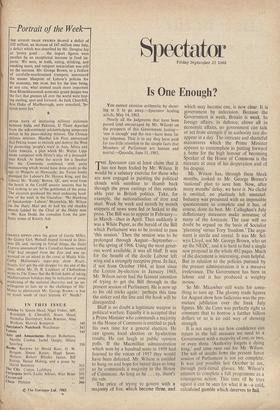Is One Enough?
You cannot exorcise arithmetic by shout- ing at it to go away.—Spectator leading article, May 14, 1965.
Nearly all the judgments that have been passed (and encouraged by Mr. Wilson) on the prospects of this Government lasting— 'one is enough' and the rest—have been far too inhuman. That is to say they have paid far too little attention to the simple facts that Members of Parliament are human and mortal.—Quoodle, June 11, 1965.
rr HE Spectator can at least claim that it.
I has not been fooled by Mr. Wilson. It would be a salutary exercise for those who are now engaged in pairtting the political clouds with sunshine to thumb back through the press cuttings of this remark- able year in British politics. Take, for example, the nationalisation of iron and steel. Week by week and month by month snippets of news were fed or leaked to the press. The Bill was to appear in February— in March—then in April. Then suddenly it was a White Paper, as the herald of the Bill which Parliament was to be invited to pass 'this session.' Then the session was to be prolonged through August—September- to the spring of 1966. Using the most gener- ous word available, it was all bluff. It was for the benefit of the docile Labour left wing and a strangely receptive press. In fact, if not from October 1964, at least since the Leyton .by-election in January 1965, Mr. Wilson never had the faintest intention of trying to get the Bill through in the ' present session of Parliament. He is now up to his old tricks again : perhaps this time the sinker and the line and the hook will be disregarded.
Bluff is no doubt a legitimate weapon in political warfare. Equally it is accepted that a Prime Minister who commands a majority in the House of Commons is entitled to pick his own time for a' general election. He can ignore local election or by-election results. He can laugh at public opinion polls. If the Macmillan administration which won by a hundred seats in 1959 had listened to the voices of 1957 they would have been defeated. Mr. Wilson is entitled to hang on and hope for better days as long as he commands a majority in the House of Commons. As long as he . . . ay, there's the rub.
The price of trying to govern with a majority of five, which became three, and which may become one, is now clear. It is government by indecision. Because the Government is weak, Britain is weak. In foreign affairs, in defence, above all in economic affairs, no government can talk or act from strength if its authority can dis- appear in a day. The intricate and shameful manoeuvres which the Prime Minister appears to contemplate in putting forward a name for the high honour of becoming Speaker of the House of Commons is the measure at once of his desperation and of his despair.
Mr. Wilson has, through these bleak months, looked to Mr. George Brown's `national' plan to save him. Now, after many months' delay, we have it. No cliché is omitted, no platitude left unstated. Industry was presented with an impossible questionnaire to complete and it has, of course, done its best. Mr. Callaghan's July deflationary measures make nonsense of many of the forecasts. The case will no doubt be argued on the basis of Socialist 'planning' versus Tory 'freedom.' The argu- ment is sterile and unreal. It was Mr. Sel- wyn Lloyd, not Mr. George Brown, who set up the NEDC, and it is hard to find a single new proposal in the whole 492 pages. Much of the document is interesting, even helpful. But in relation to the policies pursued by the present administration it is a massive irrelevance. The Government has been in labour and it has produced a weighty mouse.
So Mr. Micawber still waits for some- thing to turn up. The gloomy trade figures for August show how ludicrous was the pre- mature jubilation over the freak July figures. Mr. du Cann was perfectly right to comment that to borrow a further billion dollars or so is an odd way of showing strength. It is not easy to see how confidence can return in the full measure we need to a Government with a majority of one, or two, or even three. 'Authority forgets a dying king,' and time runs out for Mr. Wilson. The toll of deaths from the present fierce session of Parliament is not yet complete.
It was just possible last October to see, through pink-tinted glasses, Mr. Wilson's attempt to complete a full programme as a courageous action. This time (if he tries again) it can be seen for what it is—a cold, calculated gamble which deserves to fail.






























 Previous page
Previous page